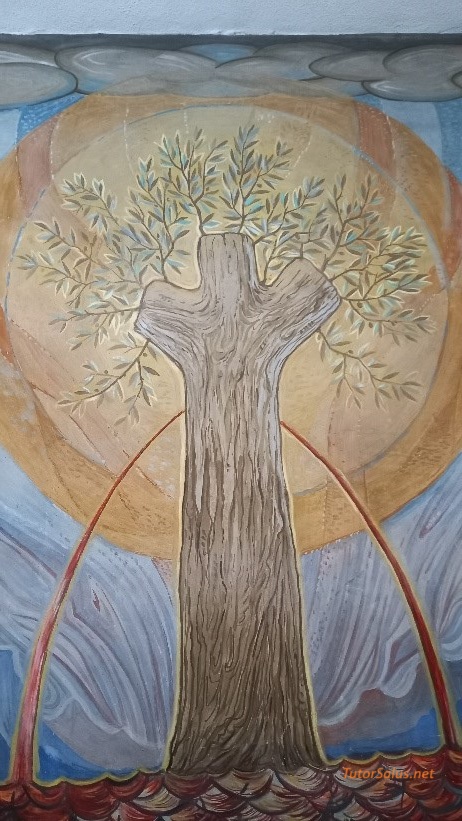the graft.

Detail from the fresco by Luciano Bartoli[1] in the baptistery of the parish church ‘Sant’Ambrogio Ad Fontes’, Segrate-MI.
It is a recent film, ‘C’è ancora domani’[2], first feature and excellent debut as director for the good actress Paola Cortellesi : it focuses on what moves one’s mind and that can never be said ‘resiliency’, a term that is linked to the study of inert materials but not to humans because it doesn’t come into one’s law of thinking. Paola Cortellesi doesn’t make a narration, instead she focuses on something that it is not at all neutral, like the imputability of a beginning, and she does it with courage and with skilful lightness : we are as grateful to her also for this, as we are to the excellent Hitchcock[3], certainly her predecessor.
Attributable here is not only her cruel husband, the collaborationist father-in-law, the inert neighbours, the ancient and useless lover : in the lucid transparency of a text[4] of which the good Cortellesi is author too, the attributable person appears to be also the victim, that is Delia, whose defense consists in a desperate estrangement, just fed on little tricks : an estrangement artfully created by her, and of which only at the end we learn that it did not prevent her to remember when things went well with her husband.
Of the three children, the eldest Marcella is who provokes in the adult woman that graft – trigger of a thinking which really hurts : of being nothing, that is, and not only at home but socially, in her own city that was Rome after the end of the Second World War, in that esplicit disorder that the war had kept silent, with the arrival of new allies to democracy but disliked by the loyalists of the old regime whose economy is based on the exclusion of identites. Then it misleads us, we all that are on this side of the big screen, the receiving of a sealed envelope addressed to Delia, delivered to her almost secretly by the concierge : do we forgive her ?
A deception for all of us, no easy pink story behind that envelope, no naivety in the next settling of accounts that turns the tide, so incredible but very reasonable indeed… In short, Paola Cortellesi focuses the non-naive ability to keep a place for the other, for your similar who may ‘occur’ partner : and beasts, that as we know ‘are other than animals’, don’t care about this.
Attributable is naivety, always painful, as it buries a ‘psychic occurrence’ : but, at the same way, attributable and imputable is one’s memory because it is actually ‘work’.
One’s ascribility, or excitement[5], is just the first step as the indication of a crossroads that is not at all obligatory, just an opportunity that our thinking offers us in the shape of an appointment to be elaborated and worked on.
Compulsion is therefore not all our unconscious, there is still free memory that should not be lost : a matter I will take up again.
Marina Bilotta Membretti / Cernusco sul Naviglio – December 27, 2023
[1] Luciano Bartoli (Trieste 1912 – Padova 2009) dedicated himself almost exclusively to religious iconography : his first assignment, already in 1935, was to decorate the church of Santa Caterina at lsola d’Istria, which was followed by commissions for other churches in Udine, Padova, Treviso, Trieste, Issogne (Val d’Aosta) as well as the design of numerous windows. (Information taken from: ‘Un’arte per contemplare. Percorso iconografico nella chiesa di ‘Sant’Ambrogio Ad Fontes’, di Isabella Bertario – 2022; ‘Le nuove chiese della diocesi di Milano 1945-1993’, a cura di Cecilia De Carli – ‘Vita e pensiero’ (Milano, 1994). ‘Sant’Ambrogio Ad Fontes’ is one of the 22 celebratory churches of the Second Vatican Council, promoted in the Ambrosian diocese by the then Archbishop Cardinal Montini, now Saint Paulus VI, and was consecrated on April 25, 1966.
[2] ‘C’è ancora domani’ (2023) has been conceived, directed and performed by Paola Cortellesi. Other interpreters : Valerio Mastandrea, Romana Maggiora Vergano, Emanuela Fanelli, Giorgio Colangeli, Vinicio Marchioni, Francesco Centorame. Presented at the 18th edition of the ‘Festa del Cinema’ of Rome, the film received the special prize from the jury and a special mention as the best first film. It has been produced by Mario Gianani and Lorenzo Gangarossa for ‘Wildside’ and ‘Vision Distribution’.
[3] Alfred Hitchcock (1899 – 1980) directed, among the others : ‘Psycho’, ‘The Birds’, ‘Rear Window’, ‘Vertigo’.
[4] Subject and screenplay : Furio Andreotti, Giulia Calenda, Paola Cortellesi.
[5] In ‘Il pensiero di natura. Dalla psicoanalisi al pensiero giuridico’, by Giacomo B. Contri SIC Edizioni (1998), pg. 54, 95.

